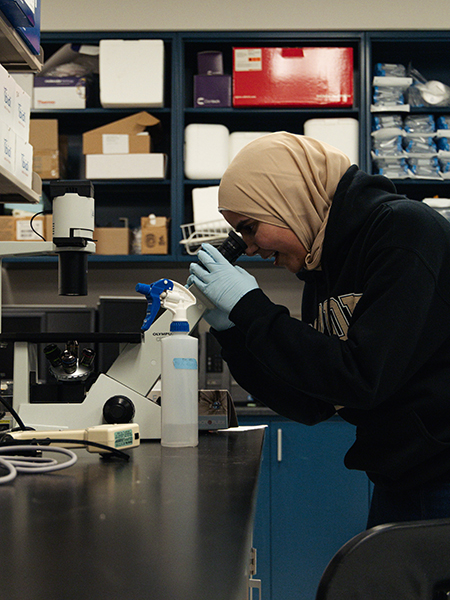BME sophomore in Indianapolis builds repertoire to address healthcare disparities

Laila Abdelwahab’s summer biomedical engineering experience in 2024 was “crazy intense in the best way possible.”
She had expected to start learning anatomy, medical devices or anything else about medicine as a science. And she would, on the job and in surgery rooms and at patients’ bedsides.
But the seven-week program Indiana Summer Clinical Residency in Innovation for Biomedical Engineers, or (IN)SCRIBE, started with one week of important context Abdelwahab would say changed the trajectory of her degree in biomedical engineering: health disparities and discrimination in care.
“No one tells you these (disparities) exist unless you’re experiencing it yourself,” Abdelwahab, a Purdue sophomore in Indianapolis, said. “It opened my eyes … I don’t have any issues communicating with doctors, but what if you can’t speak English? How do you get help when you need it? This city has so many diverse groups of people. You must learn about how people approach their lives to help them the best.”
(IN)SCRIBE (ENGR 29500), created in 2021, challenges students to examine engineering through the lens of public health, healthcare and providing access to patients from any background with a special emphasis on highlighting the plights of vulnerable populations. The summer program immerses students in clinical rotations through local hospitals and puts them in teams to design solutions for hospital staff and patient needs. Located only at Purdue University in Indianapolis, the program uses its adjacence to city hospitals that serve diverse populations to place its students in community and culturally engaged experiences while challenging their engineering skills in new environments.
(IN)SCRIBE is an invitation-only program that requires a rigorous application and substantial time commitment. Abdelwahab’s application after her first year at Purdue stood out to Steven Higbee, associate professor of practice in the Weldon School of Biomedical Engineering.
“As a co-director of the (IN)SCRIBE Program, I was impressed to watch Laila confidently work alongside more senior students as they worked toward a design to promote more equity in health care,” Higbee said.

Abdelwahab’s four weeks of rotations exposed her to pediatric nephrology, neurosurgery, cardiology and orthopedics. She watched a cardiologist operate machinery to create scans, witnessed several surgeries and regularly interacted with BME professionals in diverse roles. She also asked some unusual questions to collect data for the group’s seventh-week design project.
“When I was in the hospitals, I was taught to ask, ‘How could you make things better?’” Abdelwahab said. “So talking to surgeon I’d ask things like, ‘What annoys you about this device?’ Same with nurses and even patients. We were collecting all this information so when we did the design project, we knew how to better assist everyone.”
In the last week of (IN)SCRIBE, her team created a monitoring device to manage tacrolimus levels in kidney transplant patients, an immunosuppressant treatment that keeps a body from attacking a transplanted organ and causing infection. Her design made monitoring post-transplant patients “more accurate and economic” than previous methods, according to Higbee.
Getting a good handle on the hospital staff’s needs meant catching professionals whenever they were available in the 8 a.m.-4 p.m. range — and sometimes, in the hours before sunrise.
“(IN)SCRIBE made me so much more resilient and patient with myself, because some days you have to be up at 4 a.m. to show up for 6 a.m. meetings,” Abdelwahab said.
While her goal is ultimately to address disparities and care to vulnerable populations, Abdelwahab hasn’t decided exactly how she wants to pursue her goals as a professional. But with BME, she has plenty of time to test the waters. Whatever ideas she doesn’t explore now, she plans to investigate later for her capstone project.
“With biomedical engineering, you're not just limited to just working in industry. In one rotation, I was introduced to research, and I thought it sounded really cool. Then in another, industry sounded really cool,” she said. “When coming into Purdue, I knew I wanted to choose a field where I have these different directions I can go to and explore right now during college.”
It also helped that all of Abdelwahab’s older siblings attended Indianapolis — in biology and dentistry — before she had even applied to Purdue. Her parents, Purdue graduates, were passionate supporters of her education. Her dad earned a doctorate in virology in West Lafayette, which sourced Abdelwahab’s passion for healthcare and study.
“One of the main reasons I chose (Purdue in Indianapolis) was the classroom sizing and the relationship you have with your professors,” Abdelwahab said. “Because of how tight-knit BME is, you're getting to know your professors on a deeper level. You’re building a relationship, and they get to see you grow as a student.”
With a drive for learning in a small community, Abdelwahab is also a member of the John Martinson Honors College, where she integrates industry learning with art, literature, health and other related courses for a new perspective. For one of her contracts — teaching an integrated and well-researched lesson, researched with a team on their own time, in a college classroom — Abdelwahab took a lesson on forces that act on bodies and created a 3D model of a hip joint to show how varying impacts affected it.
Research energizes her, as does working in a group to make new discoveries. “I really like that (my experience) is intermingled with downtown. Purdue in Indianapolis is definitely the right place for me.”
